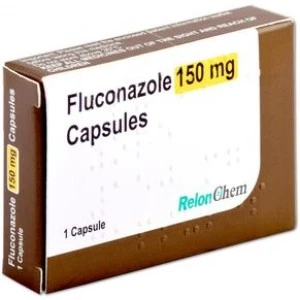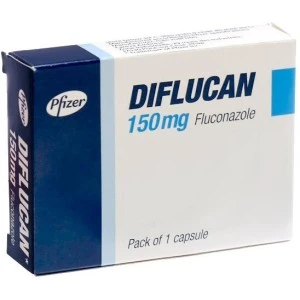Fluconazole
- Click on the green "Get Started" button, then click "Start Consultation" button on the next page.
- Fill in our short consultation form.
- Choose delivery method and mode of payment.
- Our team of expert prescribers will assess whether medication is suitable.
- If you get the green light and it is deemed suitable, your order will be processed quickly and efficiently.
Your privacy is important, Prescription Doctor are committed to keeping your details completely confidential.
This is why we also take steps to conceal your prescription products under two layers of packaging.
We have a commitment to delivering a discreet service and understand your need for privacy. We ship all orders via a trackable courier using discreet, plain packaging.
Once your order is dispatched you will receive a tracking number via sms and email.
We deliver medications between Monday and Saturday. You can upgrade to Saturday delivery on Friday.
You should receive a tracking number with your order which you can use this number to track your parcel online. This should give you a clear indication of where your parcel is. If you haven’t received your parcel in the time frame given by our couriers, contact your local depot to find out where it is. You can also contact our support team who will do this for you.
On checkout you will be asked to leave your mobile number so our courier can text you about the delivery. This is also useful if the courier has problems finding your address. We will not use your mobile number for anything else.
You can pay for your order using credit, debit card or via bank transfer.
If you don’t have a credit or debit card you can pay via bank transfer. We will give you a unique reference number at checkout along with details of how to make the transfer. Once the money has cleared in our account, we will process your order.
We are a completely secure site and take many measures to ensure your details are kept safe. We understand that you have a right to extreme privacy when purchasing sensitive health medications. All information that you provide to us is stored on our secure servers. Any payment transactions will be encrypted using SSL technology.
You can pay for your order using credit, debit card and bank transfer.
Card Payment: Please notify us that you wish to cancel your order. Your refund will show available In 1 - 3 days.
Bank Transfer: A member of our team will contact you requesting for your bank details. These details are only used to transfer the funds back into your account.
Patient Reviews: How Fluconazole Has Made a Difference
Table of contents:
What is Fluconazole 50mg & 150mg Used For?
Fluconazole is an antifungal treatment used to treat various fungal infections, including thrush (candidiasis), ringworm, jock itch and athlete's foot.
Fluconazole kills the Candida fungi directly. Fluconazole 150mg tablets are also available as the brand Diflucan.
Candida is the most prevalent cause of thrush in men and women and can cause infections in the mouth, genitals and bloodstream.
Symptoms of thrush include:
- A white discharge that resembles cottage cheese
- Itching of the vulva (the outside of the vagina)
- Penile or vaginal irritation, soreness and redness
- Pain or discomfort during sex or while urinating
For more information on the symptoms of thrush, visit the NHS website.
While thrush is not typically contagious, it's best to treat thrush as soon as possible to reduce the severity of symptoms.
If you experience recurrent bouts of thrush, it's essential to speak to your doctor, as there could be an underlying reason why you keep getting thrush.
How our service works
With Prescription Doctor, you can buy fluconazole online.
To begin your order of fluconazole 150mg capsules, fill out our online medical form, and one of our prescribers will determine whether fluconazole is suitable for you.
If our prescriber approves your request before 3pm on a weekday, our qualified pharmacists will dispense and dispatch fluconazole tablets to you via discreet next-day delivery.
How does fluconazole work?
Fluconazole prevents fungal cells from producing ergosterol, a substance they require for survival.
Without ergosterol, the fungal cell membrane weakens and breaks apart, resulting in cell death.
How long does fluconazole take to work?
The time it takes for fluconazole to work will depend on the location and severity of the condition.
For oral thrush, vaginal thrush and penile thrush (balanitis), your symptoms should improve after taking fluconazole for a week.
Other conditions, such as ringworm or fungal nail infections, may take longer.
How do I take fluconazole?
Swallow fluconazole 150mg capsules whole with a glass of water.
Do not crush or chew fluconazole capsules.
Fluconazole capsules can be taken with or without food.
How long do I need to take Fluconazole?
The typical dose for genital thrush is a single 150mg fluconazole capsule as a one-off dose.
Other fungal infections may require a longer treatment course. For instance, athlete's foot may require treatment for up to 6 weeks.
Our Pharmacist can review and suggest a suitable treatment plan to help clear your thrush.
You must continue taking fluconazole for the duration prescribed. Stopping treatment early can lead to the infection recurring.
What should I do if I forget to take fluconazole?
If you forget to take fluconazole at the scheduled time, take it as soon as you remember.
If it is nearly time for your next dose, skip the missed dose and continue taking fluconazole as directed by your doctor.
Do not take a double dose of fluconazole to make up for a missed dose.
What should I do if I take too much fluconazole?
If you or someone else takes more fluconazole than prescribed, go straight to your nearest accident and emergency department. Take the packaging and remaining medicine with you so that doctors know how much of the medicine was taken.
If you are unsure how to take fluconazole 150mg capsules, ask your doctor.
Who should not take fluconazole?
Fluconazole is not suitable for everyone. You should consult your doctor before taking fluconazole to ensure it is safe for you.
Fluconazole may interact with some medications. Please inform our prescriber of all other medications you are currently taking during your online consultation.
Fluconazole 50mg & 150mg capsules contain lactose. Inform our prescriber if you are intolerant to some sugars.
Fluconazole 50mg & 150mg interactions
Fluconazole may interact with the following:
- Astemizole
- Cisapride
- Ergotamine
- Methysergide
- Pimozide
- Quinidine
- Terfenadine
This is not a complete list of interactions. To view a comprehensive list, visit NICE Interactions.
If you are unsure whether fluconazole will interact with a medicine you are currently taking, please inform our online prescribers of all medicines you have taken in the past four weeks.
Fluconazole side effects and cautions
Before taking fluconazole, you must read the patient information leaflet enclosed with your medicine.
All medicines carry the risk of side effects, although not everyone experiences them. Being vigilant of potential side effects is essential to your care.
Common fluconazole side effects include:
- Diarrhoea
- Headache
- Increases in blood tests of liver function
- Nausea
- Rash
- Stomach ache
- Vomiting
This is not an extensive list of side effects. Further information regarding the safety of fluconazole, including a complete list of side effects, can be found within the patient information leaflet enclosed with your medicine.
If you experience any side effects of fluconazole, inform our prescriber
Allergies
Do not take fluconazole if you are allergic to fluconazole or any of the other active ingredients listed in the leaflet.
If you experience an allergic reaction after taking fluconazole, contact your doctor and go straight to your nearest A&E department.
Signs of an allergic reaction:
- Chest tightening
- Dry, red, and cracked skin
- Itchy, red, watery eyes
- Raised, itchy, red rash (hives)
- Swelling of the lips, tongue, eyes or face
- Tummy pain, nausea, vomiting or diarrhoea
- Wheezing
Pregnancy and breastfeeding
If you are pregnant or breastfeeding, you should consult your doctor before taking fluconazole.
Your doctor will be able to determine the safety of this medicine for you and your condition.
Frequently asked questions
Will fluconazole affect my ability to drive or operate machinery?
Fluconazole is unlikely to affect your ability to drive or operate a machine.
If you experience dizziness or drowsiness while taking fluconazole, avoid activities that require alertness until you feel safe.
Can I drink alcohol while taking fluconazole?
Alcohol consumption is unlikely to impact the effectiveness of the drug.
However, it is best to avoid or limit alcohol consumption while taking fluconazole. Alcohol consumption can increase the risk of experiencing side effects or make already present side effects worse.
Moreover, the sugar and yeast in alcoholic beverages may promote the growth of fungal infections, making them difficult to treat.
Will fluconazole affect my contraceptive pill?
It is unlikely that fluconazole will impact the effectiveness of your oral contraceptive pill.
If you experience vomiting or diarrhoea after taking fluconazole, follow the appropriate guidance listed in the leaflet for your oral contraceptive pills.
Can I get fluconazole 150mg capsules over the counter?
Fluconazole 150mg capsules are available only by prescription in the UK and cannot be purchased over the counter.
With Prescription Doctor, you can purchase fluconazole online from our UK pharmacy after completing an online consultation with one of our doctors.
Are fluconazole 150mg and Diflucan the same?
Diflucan is a brand of fluconazole. Both generic fluconazole and Diflucan contain 150mg of fluconazole.
Will fluconazole treat oral thrush?
Fluconazole can be used to treat oral thrush.
Can I get Fluconazole 150mg at Boots?
Fluconazole isn't only available at high street pharmacies, such as Boots, Superdrug or Lloyds. You can also get Fluconazole 150mg capsules online from Prescription Doctor. Our online healthcare professionals are on hand to discuss whether fluconazole is right for you.
After completing our online consultation, you'll be put in contact with one of our online prescribers to discuss your condition and the treatment. All the treatments we offer are shipped from a UK-based pharmacy via a fast, next-day delivery service.
Sources
Ranbaxy Ltd, 2021. Fluconazole 150 mg Capsules: Summary of Product Characteristics
NHS, 2020. Fluconazole.
Treatment information
- Product Name: Fluconazole
- Active Ingredient(s): Fluconazole
- Administration: Oral
- Presentation: Capsules
- Available Strength: 150 mg
- Exemption: Pharmacy
- Application: Men and women over 18
- Dosage: Take one capsule daily/weekly
- Description: Fluconazole is an antifungal medicine which treats a range of fungal infections
- Drug Class: Antifungal
- Alcohol Consumption: Avoid or limit alcohol consumption
- When Pregnant: Tell your prescriber if you are pregnant or intend on becoming pregnant.
- When Breastfeeding: Tell your prescriber if you are breastfeeding.
- Price: 7.99 GBP
Authored & Reviewed By

Mohamed Imran Lakhi
MPharm - Lead PharmacistPublished on: 28/03/2019 Reviewed on: 13/03/2024
Thrush Alternatives
Terbinafine
- Directly kills fungus
- Easily applied to site of infection
- Short course of treatment
© 2013 - 2026 Al Muhsineen Limited. All Rights Reserved. Registered Pharmacy: 34 Halliwell Road, Bolton BL1 8RL. Registered Office: 254 First Floor, Shearbrow, Blackburn, England, BB1 8DS








